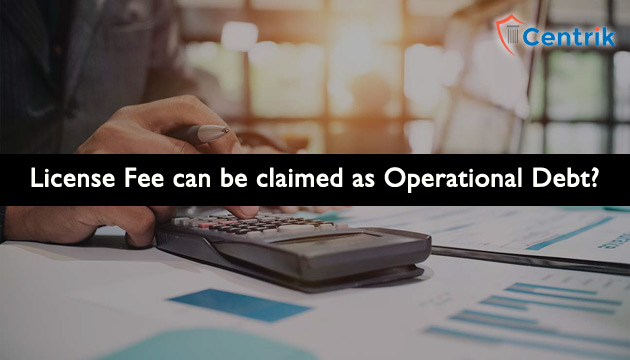
Status as on- 10/08/2022
The Hon`ble, 5 Judges bench of National Company Law Appellate Tribunal (hereinafter referred to as “NCLAT” in short) affirmatively decided license fee to be operational debt in the case of Jaipur Trade Expo-Centre Private Limited Vs M/s Metro Jet Airways Training Private Limited, Company Appeal (AT) (Insolvency) No. 423 of 2021.
Facts: – That the Applicant/ Operational creditor (hereinafter referred to as “OC”) was holding with Respondent/Corporate Debtor, a License Agreement dated 15/04/2017 to run an educational institution and such License fee was unpaid. That on 03/05/2019 being aggrieved, OC issued a Demand Notice, and subsequently filed an application under Section 9 of Insolvency and Bankruptcy Code, 2016 (hereinafter referred to as “Code”) which was dismissed by Adjudicating Authority (hereinafter referred as “AA”), vide its order dated 04.03.2020 holding that claim arising out of the grant of License to use of the immovable property does not fall in the category of Goods or Services. Thus the Amount claimed under Sec 9 is not an Operational Debt and therefore Application can`t be allowed. In consequence of dissatisfaction, the Operational Creditor approached NCLAT.
Issue: –
- Whether the License fee, which is claimed to be due from the corporate Debtor, is an “Operational Debt” within the meaning of Section 5(21) or not.
Analysis: –
- The Hon`ble NCLAT discussed in detail, the meaning and scope of the term “Service” with reference to operational debt and concluded that the claim of the Operational creditor for payment of License fee is fully covered as the claim defined under sec 3 (6) of the code and liability or obligation in respect of the said claim becomes a debt on the part of Corporate Debtor within the meaning of sec 3(11) of the code.
- The NCLAT also noted the judgment of this Tribunal, in Mr. M. Ravindranath Reddy’s case does not lay down the correct law for the following reasons:
-
- does not consider the extent and expanse of the expression ‘service’ used in Section 5(21) of the Code
- reliance on the Term “Essential Service” as used in Section 14(2) of the Code for interpreting ‘service’, explained a very restricted meaning of service.
- In the facts of the present case, where the Agreement itself contemplates payment of GST for the services under the Agreement, on which GST is payable, the definition of ‘service’ under Central Goods and Services Tax Act, 2017 cannot be said to be irrelevant. More so, even if an expression is not defined in the statute, the meaning of the expression in general parlance has to be considered for finding out the meaning and purpose of expression.
Conclusion-
- The Honorable court concluded that both in Mr. M. Ravindranath Reddy and Promila Taneja this Tribunal did not dwell upon the correct meaning of expression ‘service’ used in Section 5(21) of the Code. In any view of the matter, in the above-mentioned two cases, the dues were in the nature of rent of immovable property whereas the present is a case of the license granted for use of premises on Warm Shell Building with fittings and fixtures, electrical, flooring as per good corporate standards. Hence, the License was licensed for a particular kind of service for use by the Licensee for running a business of Educational Institution. Hence, in the present case, debt pertaining to unpaid license fee was fully covered within the meaning of ‘operation debt’ under Section 5(21), and the Adjudicating Authority committed an error in holding that the debt claimed by the Operational Creditor is not an ‘operational debt’
- In view of the above, NCLAT answered the questions referred to the larger Bench in the following manner:
-
- Judgment of this Tribunal in Mr. M. Ravindranath Reddy (supra), as well as judgment in Promila Taneja’s case, does not lay down the correct law.
- The claim of Licensor for payment of license fee for use of Demised Premises for business purposes is an ‘operational debt’ within the meaning of Section 5(21) of the Code.
- Accordingly, the appeal Allowed and directed AA to admit the application within 1 Month.
Disclaimer- The above article is based on the personal interpretation of the related orders and laws. The readers are expected to take expert opinions before relying upon the article. For more information, please contact us at support@centrik.in




 join For Updates
join For Updates